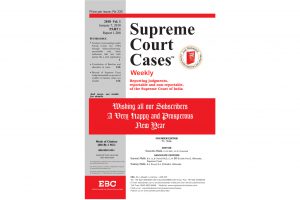Administrative Law — Natural Justice — Bias/Nemo Debet Esse Judex In Propria Sua Causa: The plea of “bias” has to be founded on substantial material qua the officer concerned who acts in a quasi-judicial capacity and if the lis can be decided on other legal grounds, such plea should not be entertained. Further, every adverse order passed against a litigant is injurious to a losing party, however, that does not give him a right to attack the adverse order by attributing bias against authority/court. [Manish S. Pardasani v. State Excise, (2019) 2 SCC 660]
Bombay Tenancy and Agricultural Lands Act, 1948 (67 of 1948) — Ss. 32-F(1)(a), 31(3) & 32 [as amended by Act 49 of 1969 and Act 15 of 1957] — Knowledge to tenant about cessation of disability of landlord: Provision under S. 32-F(1)(a) of 1948 Act, inserted vide Amendment Act 49 of 1969, require a minor landlord to intimate his tenant about cessation of his disability relating to minority so as to enable the tenant to exercise his right to purchase. Issue that such intimation to tenant about cessation of disability if also required in respect of other two categories of disabled landlords i.e. (i) widows, and (ii) persons subject to mental/physical disability, referred to a larger Bench. [Vasant Ganpat Padave v. Anant Mahadev Sawant, (2019) 2 SCC 788]
Civil Procedure Code, 1908 — S. 152 — Order on “Note for speaking to the Minutes” i.e. rectification of earlier order/judgment: A “note for speaking to Minutes” is required to be entertained only for the limited purpose of correcting a typographical error or an error through oversight, which may have crept in while transcribing the original order. Further, a “Note for speaking to the Minutes” cannot be considered on a par with a review application or with an application for clarification/ modification of an order. [Akhil Bhartvarshiya Marwari Agarwal Jatiya Kosh v. Brijlal Tibrewal, (2019) 2 SCC 684]
Criminal Procedure Code, 1973 — S. 372 proviso [introduced w.e.f. 31-12-2009] and Ss. 2(wa), 2(d) and 378 — Right of victims to appeal against acquittal: Nature, Scope and Applicability of right of “victim” as defined in S. 2(wa) to appeal against acquittal under S. 372 proviso, explained. [Mallikarjun Kodagali v. State of Karnataka, (2019) 2 SCC 752]
Industrial Disputes Act, 1947 — S. 25-H — Applicability: To attract S. 25-H, it must be proved by workman that he was “retrenched employee”, his ex-employer had decided to fill up vacancies and hence, he was entitled to claim preference against other applicants. [Barara Coop. Mktg.-Cum-Processing Society Ltd. v. Pratap Singh, (2019) 2 SCC 743]
Motor Vehicles Act, 1988 — Ss. 166 to 168 and S. 50(1)(b) r/w S. 2(30) — Liability of registered owner: Liability of registered owner of vehicle to pay compensation in case of accident is not absolved, even when such vehicle stands transferred and accident occurs prior to expiry of period prescribed under S. 50(1)(b) to report transfer. [Prakash Chand Daga v. Saveta Sharma, (2019) 2 SCC 747]
Penal Code, 1860 — S. 436 r/w S. 34: In this case of family property dispute and cross-complaints, as the possibility of false implication cannot be ruled out, conviction was found unsustainable. [Shanthamalleshappa v. State of Karnataka, (2019) 2 SCC 679]
Penal Code, 1860 — Ss. 228-A, 376, 376-A, 376-AB, 376-B, 376-C, 376-D, 376-DA, 376-DB and 376-E — Prohibition on disclosure of name and identity of victims of sexual offences: Considering the exceptions to the said prohibition, held, S. 228-A prohibits not only the publication of the name of the victim but also the disclosure of any other matter which may make known the identity of the victim. No person can print or publish in print, electronic, social media, etc. the name of the victim or even in a remote manner disclose any fact which can lead to the victim being identified and which should make her identity known to the public at large. Object behind such legislation is to protect the aforesaid victims from any hostile discrimination or harassment in future. [Nipun Saxena v. Union of India, (2019) 2 SCC 703]
Specific Relief Act, 1963 — S. 31 — Onus to prove invalidity of a registered sale deed: A registered document carries with it a presumption that it was validly executed and it is for the party challenging the genuineness of the transaction to show that the transaction is not valid in law. [Jamila Begum v. Shami Mohd., (2019) 2 SCC 727]

